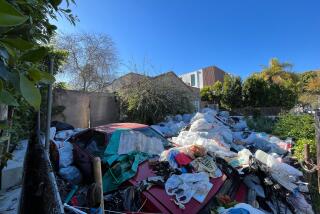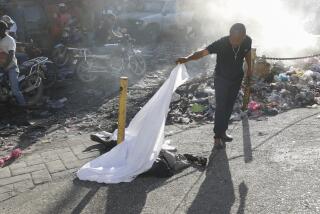Filth-Sensitive Haitians Scrub One of World’s Dirtiest Capitals Clean, Block by Block
- Share via
PORT-AU-PRINCE, Haiti — One of the world’s dirtiest capitals is becoming cleaner because public-spirited citizens got fed up with the filth and decided to tackle it themselves.
“Everybody’s sick and tired, and ashamed, of the situation,” said Cayotte Bissainthe, co-director of Lave Figi Potoprens, Creole for Let’s Wash the Face of Port-au-Prince.
“If the government can’t cope, we’ll roll up our sleeves and clean up the mess ourselves,” she said.
From her makeshift office downtown, Bissainthe and three other unpaid members of the Lave Figi steering committee coordinate 100 neighborhood committees involved in the project.
Cleanup squads have been taking a city block at a time, sweeping, hauling away refuse, hosing down and sometimes repairing the pavement, even planting trees in old tires filled with earth. In some cases, they’ve added a decorative touch by painting wall murals.
“The response has been wonderful and shows how full of life and hope the Haitian people are, in spite of all our troubles,” Bissainthe said.
This destitute city of more than 1 million people has long been not only unsightly, but woefully unsanitary, with chest-high heaps of garbage on every corner, and sometimes even in the middle of the street.
Only 50% of the 500 tons of garbage the capital produces daily was picked up even in better times--before the Public Works Ministry took over garbage collection from the city last year.
Torrential rains washed the rest downhill, through the slums and into the polluted bay.
Ecologists of the Federation of the Friends of Nature raised alarms about the health hazard but the city government went broke and, through similar mismanagement and corruption, so did the Public Works Ministry.
Since April 12, when the government officially recognized it, Lave Figi has received $4,350 in private donations, ranging from individual gifts of $2 to a $2,100 contribution from the Roman Catholic charity CARITAS.
President Ertha Pascal Trouillot’s civilian government, which assumed power March 13, is in financial straits and has not yet been able to fulfill its promise of funds for the campaign.
Lave Figi has used the donated money to buy safety masks and hire workers to load garbage trucks. Businessmen provide some workers on loan.
Shovels, rakes and wheelbarrows have been donated. The government provides the garbage trucks and Lave Figi fills the gas tanks and tips the drivers.
“We have no choice but to do it ourselves; our lives and our dignity depend on it,” said Bissainthe, who was Haiti’s consul general in Puerto Rico for a time after dictator Jean-Claude Duvalier fled the country in 1986.
Response to Lave Figi was immediate from a citizenry that suffered one variety of flu after another and had to live with stench, flies, roaches and rats. Sixty neighborhood organizations joined as soon as it was formed.
“It isn’t as much as we need, but it encourages us to go on,” said Max Valbrun, 24, co-leader of the Dehoux Street Youth Committee. “In our four years’ existence, this is the first time we have been able to get any outside help.”
More to Read
Sign up for Essential California
The most important California stories and recommendations in your inbox every morning.
You may occasionally receive promotional content from the Los Angeles Times.













